Infidelity in relationship
5 Different Types of Infidelity
The consequences of infidelity are numerous, and it is only natural to want to know why your partner chose to cheat, even if knowing why doesn't bring you any relief. There could be any number of reasons, and there are many types of infidelity and cheating that could shed a little light on those reasons.
What Is Infidelity?
Infidelity, or cheating, is the act of being unfaithful to a spouse or other partner. It typically means engaging in sexual or romantic relations with a person other than one's significant other, breaking a commitment or promise in the act.
Each case of infidelity is different and fulfills a different need. Although knowing why a partner cheated likely won't lessen any pain you feel, being able to rationalize the behavior and define it will alleviate some confusion. It can also help you feel more confident in how to move forward from the situation—whether that means working on healing your relationship or moving on should you decide to split up.
Learn more about the five types of cheating below, and what to do if you find yourself the victim of infidelity.
Opportunistic Infidelity
Opportunistic infidelity occurs when one is in love and attached to their partner, but succumbs to their sexual desire for someone else. Typically, this type of cheating is driven by situational circumstances or opportunity, risk-taking behavior, and alcohol or drug use. As social psychologist Theresa E. DiDonato says, "Not every act of infidelity is premeditated and driven by dissatisfaction with a current relationship…Maybe they were drinking or in some other way thrown into an opportunity they didn't anticipate."
After the fact, the more in love a person is with their partner, the more guilt they will experience as a result of their sexual encounter. However, feelings of guilt tend to fade as the fear of being caught subsides.
Obligatory Infidelity
This type of infidelity is based on the fear that resisting someone's sexual advances will result in rejection. People may have feelings of sexual desire, love, and attachment for a partner, but still, end up cheating because they have a strong need for approval. In addition, their need for approval can cause them to act in ways that are at odds with their other feelings. In other words, some people cheat, not because they want to cheat, but because they need the approval that comes along with having the attention of others.
People may have feelings of sexual desire, love, and attachment for a partner, but still, end up cheating because they have a strong need for approval. In addition, their need for approval can cause them to act in ways that are at odds with their other feelings. In other words, some people cheat, not because they want to cheat, but because they need the approval that comes along with having the attention of others.
Romantic Infidelity
"Sometimes (but not always) a deficit in an existing relationship leads people to have extradyadic affairs," says DiDonato. This type of infidelity occurs when the cheater has little emotional attachment to their partner. They may be committed to their marriage and making it work, but they long for an intimate, loving connection with someone else. More than likely, their commitment to the marriage will prevent them from ever leaving their spouse. Romantic infidelity means pain for the other man or woman and the cheating partner—rarely does it turn into a long-term, committed relationship. Marital problems have to be quite severe before a spouse will leave the marriage for another person.
Marital problems have to be quite severe before a spouse will leave the marriage for another person.
Conflicted Romantic Infidelity
This type of infidelity occurs when people experience genuine love and sexual desire for more than one person at a time. Despite our idealistic notions of having only one true love, it is possible to experience intense romantic love for multiple people at the same time. While such situations are emotionally possible, they are very complicated and tend to create a lot of anxiety and stress. In this case, cheating partners, in their attempt not to cause anyone harm, often end up hurting everyone.
Commemorative Infidelity
This type of infidelity occurs when a person is in a committed relationship but has no feelings for their partner. There is no sexual desire or love or attachment, only a sense of obligation keeping the couple together. "Lacking love and lacking commitment to a current romantic partner are both tied to general feelings of relationship dissatisfaction," says DiDonato.
These people justify cheating by telling themselves they have the right to look for what they are not getting in their present relationship. Unfulfilled sexual desires can easily come into play here. "Maybe in their established relationship, individuals aren't engaging in the frequency of sex, style of sex, or specific sexual behaviors that they want," DiDonato adds. "This can contribute to their reasons to cheat."
It is important, for the sake of appearances, that the present relationship last. The cheater does not want to be viewed as a failure, so they stay in an unhappy relationship and seek to fulfill their needs outside the relationship.
Next Steps After Being Cheated On
Now that your confusion has hopefully been alleviated, it's up to you to decide what steps to take next. Marriages and relationships can survive infidelity, but whether or not yours survives will depend on what type of infidelity took place and how much work you're both willing to put in. It's only common sense to know that an opportunistic cheater will cheat regardless of how many times their cheating is discovered and forgiven. That said, any other reasons why your spouse cheated don't mean they won't cheat again, so keep that in mind when deciding what steps to take next.
It's only common sense to know that an opportunistic cheater will cheat regardless of how many times their cheating is discovered and forgiven. That said, any other reasons why your spouse cheated don't mean they won't cheat again, so keep that in mind when deciding what steps to take next.
How to Deal With Infidelity, According to an Expert
How to Deal With Infidelity, According to an Expert
If you've been cheated on, you might be experiencing a whirlwind of emotions. You may feel devastated one moment and angry the next. What's more, a broken heart can lead to a potentially overwhelming mix of feelings, including shame, doubt, confusion, and anxiety. Understanding and processing your emotions is an essential part of the process of healing from this type of hurt. As you begin your journey, it's important to remember that there's no one direct path to follow when recovering from a breakup, and some people might take longer to move through this process than others. Take the time you need to heal while also allowing yourself to grow and learn from the pain.
Take the time you need to heal while also allowing yourself to grow and learn from the pain.
As sexologist Rob Weiss, PhD, explains, "Damaged relationships don’t heal overnight. Moreover, damaged relationships don’t heal simply because one party wants them to." As hard as it may seem, know that you are in charge of your own process and any closure you may need is entirely your own to give.
Meet the Expert
Robert Weiss PhD, LCSW, is a clinical sexologist and the chief clinical officer of Seeking Integrity, LLC. He is the author of Out of the Doghouse and Prodependence, and host of the Sex, Love, and Addiction With Dr. Rob podcast.
When trying to figure out how to deal with infidelity, these six steps can help you cope with what transpired and deal with the emotional roller coaster that follows betrayal.
Work Through Your Feelings
You’ll likely experience different emotions as you process what happened. For instance, it’s common to feel disappointed or betrayed after infidelity, so take a moment to recognize these feelings are normal. "In general, getting over infidelity follows the usual stages of grief: shock/denial; anger/defiance; bargaining; depression, remorse; and acceptance," explains Weiss. Rather than suppressing your emotions, work through them. Coming to terms with what happened is integral to the healing process. Maintaining a daily gratitude practice, like keeping a journal, allows one to self-heal over time.
For instance, it’s common to feel disappointed or betrayed after infidelity, so take a moment to recognize these feelings are normal. "In general, getting over infidelity follows the usual stages of grief: shock/denial; anger/defiance; bargaining; depression, remorse; and acceptance," explains Weiss. Rather than suppressing your emotions, work through them. Coming to terms with what happened is integral to the healing process. Maintaining a daily gratitude practice, like keeping a journal, allows one to self-heal over time.
Don't Blame Yourself
It's all too easy to blame yourself for what happened, but you're not responsible for your partner's actions. While some self-reflection can be beneficial to your own personal growth, spiraling into harsh self-criticism and excessive self-blame actually delays the healing process. Rather than finding fault with yourself or obsessing over what might have been, place the blame squarely on the cheater.
Don't Live in the Past
Are you questioning everything about your relationship, replaying conversations in an attempt to discover what went wrong? "There is an initial stage when the betrayed partner wonders what else she or he doesn’t know about," says Weiss. "It is very difficult to trust anything the cheating partner says or does in this stage." But obsessing over the past isn’t healthy or productive. Instead of dwelling on hypotheticals, focus on the future rather than negativity, working through all the stages of the healing process and eventually coming to forgive both them and yourself.
"It is very difficult to trust anything the cheating partner says or does in this stage." But obsessing over the past isn’t healthy or productive. Instead of dwelling on hypotheticals, focus on the future rather than negativity, working through all the stages of the healing process and eventually coming to forgive both them and yourself.
Think About What You Want
Moving on after infidelity means taking the lead on how you want to live your life. Do you want to break up with your partner, or do you want to work on your relationship? Weiss suggests weighing all of the factors: "First of all, has the cheating stopped? Have the lies and secrets stopped? Generally speaking, are there more positive than negatives to the relationship? Is the cheating partner ever going to be able to restore relationship trust? There is no set formula for deciding to stay or go, but these questions can provide clarity." These are important questions without right or wrong answers.
Regardless of what others say, your greatest concern should be yourself.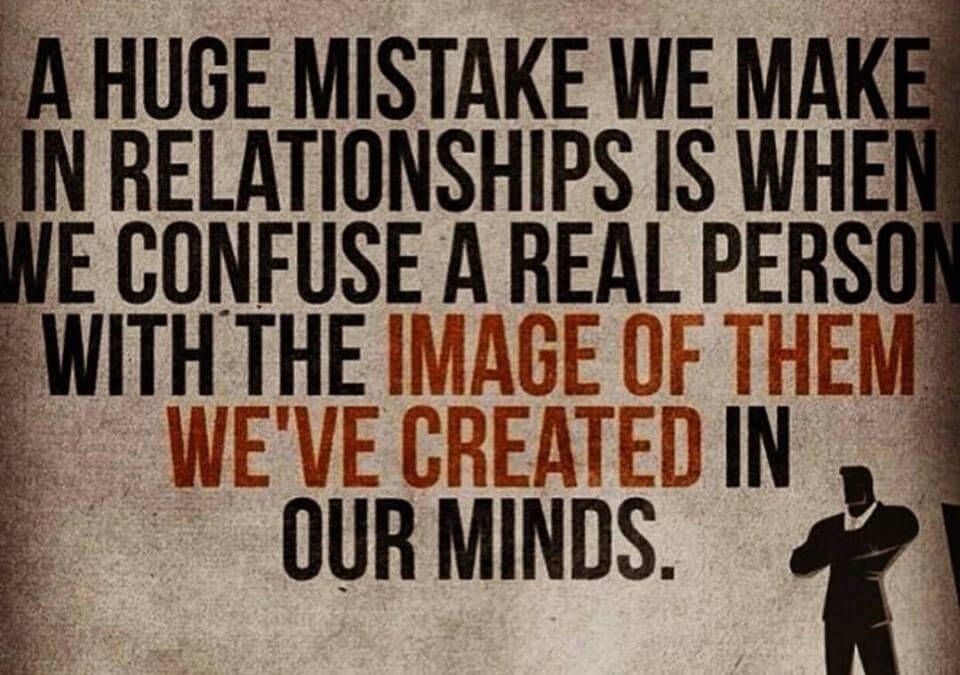 For instance, if your partner’s actions are a deal-breaker for you, break up with your partner. On the flip side, you may feel hurt and betrayed by your partner but still want them in your life. "Betrayed partners should understand that it is normal to continue to love and care for someone, even after a betrayal," says Weiss. "Both parties have to want to rebuild trust and intimate connection. The good news is that after an infidelity, if both parties do their work in the process of healing, relationships can end up being stronger than ever—deeper vulnerability, deeper intimacy, and more rather than less support of one another."
For instance, if your partner’s actions are a deal-breaker for you, break up with your partner. On the flip side, you may feel hurt and betrayed by your partner but still want them in your life. "Betrayed partners should understand that it is normal to continue to love and care for someone, even after a betrayal," says Weiss. "Both parties have to want to rebuild trust and intimate connection. The good news is that after an infidelity, if both parties do their work in the process of healing, relationships can end up being stronger than ever—deeper vulnerability, deeper intimacy, and more rather than less support of one another."
Or, then again, you may also not be sure what you want. That's okay. The decision is yours alone to make.
Regardless of your decision, try to ensure that it's being made from a place of healthy authenticity or "prodependence" rather than codependence.
Take Care of Yourself
When you’re dealing with something as life-changing as infidelity, this type of news can take a toll on you emotionally as well as physically. For instance, you may want to shut out the outside world and not see or talk to anyone. You may notice that you have difficulty concentrating at work or even find it hard to get the energy or desire to take care of yourself. But it’s imperative when faced with hardship and disappointment that you practice self-love and self-care during these difficult moments in your life.
For instance, you may want to shut out the outside world and not see or talk to anyone. You may notice that you have difficulty concentrating at work or even find it hard to get the energy or desire to take care of yourself. But it’s imperative when faced with hardship and disappointment that you practice self-love and self-care during these difficult moments in your life.
"I am a big fan of gratitude lists, exercise, journaling, and, of course, therapy and support groups for people in the same or similar situations," says Weiss.
Don't Be Afraid to Ask for Help
If you want to get over being cheated on, don't be afraid to lean on those around you for support. Being cheated on by your partner can make you feel isolated and alone. However, it would be best if you weren't afraid to reach out to friends and family after this has happened and surround yourself with people who care about you and your well-being. "Betrayed partners need support for the trauma they’ve experienced, and that support should not (and really cannot) come from their cheating partner," explains Weiss. "There is nothing worse than sitting alone after a betrayal with absolutely no one to turn to. [They] need support from empathetic others, people who understand what they’re going through. Without that, it is very difficult for them to process and work through their emotions."
"There is nothing worse than sitting alone after a betrayal with absolutely no one to turn to. [They] need support from empathetic others, people who understand what they’re going through. Without that, it is very difficult for them to process and work through their emotions."
Plus, it would help if you also didn't hesitate to meet with a trained professional who can help give you personalized strategies to deal with your new reality. You don't have to face this alone, and having more people in your corner who have your back is only going to make it easier for you to see the light at the end of the tunnel. "There is no need to wait," says Weiss. "Find a therapist who can empathetically help you work through both your day-to-day distress and your longer-term relationship questions."
6 Essential Rules For Dating
Infidelity
What is infidelity
Infidelity - adultery in love, adultery; betrayal of friendship, violation of obligations.
Dictionary of D. N. Ushakova
N. Ushakova
Infidelity is a property of a person to violate these obligations, to betray friends and loved ones, to change. Infidelity destroys the stability of the system of intimate-personal relationships and introduces it into a state of imbalance. Infidelity can be generated by many reasons. Among them are fatigue from established relationships, a thirst for change, the desire to receive new energy, new feelings and a new portion of admiration from another person. Infidelity is rooted in deep personal egoism and egocentrism, inattention to the feelings and experiences of another person. In addition, in psychology there is the concept of the "law of adultery", formulated by the famous American social psychologist Elliot Aronson. He postulates the fact that over time, spouses develop resistance to each other's high marks, and at the same time, susceptibility to mutual criticism increases. Therefore, positive assessments from the outside are perceived as more emotionally vivid and strong stimuli. Infidelity is synonymous with deceit and betrayal, and carries a powerful destructive charge. It undermines the foundations of strong human relationships based on mutual trust, understanding, friendship and love.
Infidelity is synonymous with deceit and betrayal, and carries a powerful destructive charge. It undermines the foundations of strong human relationships based on mutual trust, understanding, friendship and love.
If you find that you suffer from infidelity and are capable of betrayal, then you have serious work on yourself. First of all, it begins with the restoration of real spiritual values that make a person a person. Among them, it is loyalty that occupies a leading position. Teach yourself to be responsible for your words and deeds, always keep your word, take care of your friends and loved ones. Finding fidelity will help you alleviate deep personal anxiety, stabilize your life.
- Infidelity is a product of selfishness.
- Infidelity is an uncontrollable craving for new relationships.
- Infidelity is the opposite of loyalty and devotion.
- Unfaithfulness is a harbinger of betrayal and deceit.
- Infidelity is not a solution; it is itself not only a problem, but also a source of new problems.

Disadvantages of infidelity
- Infidelity depreciates relationships and destroys the family.
- Infidelity can cause a heart attack.
- Infidelity leads to a split personality.
- Infidelity can cause physical violence in the family.
- Infidelity of parents makes children suffer.
Manifestations of infidelity in everyday life
- Female infidelity and genetics. At the beginning of the XXI century, scientists began to conduct experiments to study the relationship between adultery and genetics. The data obtained was simply stunning. According to research results, up to 15% of men were not the fathers of their children in terms of biology. It turns out that women cheat more often than is commonly believed! But that's not all. Up to 55% of all cheating on the part of the beautiful half of society falls on the period of ovulation. Usually it lasts all 5-6 days, but it is during this period that women's intuition sharpens.
 They cheat because they are looking for the most powerful and courageous man to procreate. [Source]
They cheat because they are looking for the most powerful and courageous man to procreate. [Source] - The film "The price of betrayal". The film "The Price of Treason" with Clive Owen and Jennifer Aniston in the lead roles introduces viewers into the calm and quiet world of the main character's family named Charles Shine. He is a devoted husband and caring father. But suddenly the peace of his life is disturbed by the fatal beauty Lucinda, provoking the emergence of an impulse of infidelity. What will be the price of betrayal for Charles? Perhaps you will look at the concept of "infidelity" in a new way after watching the movie.
- Infidelity and stoning. Under the Iranian penal code, adultery is punishable by death by stoning. Not so long ago, an amendment was made to the law, allowing to replace this type of death penalty with another, although it is not specified which one. [Source]
- Cheating helps to lose weight? Scientists have found a way to quickly lose weight.
But it is only suitable for people who are married or in a long-term stable relationship. According to statistics, about 50% of men and 62% of women have dramatically lost weight after infidelity. [Source]
How to overcome infidelity
- Return the value of loyalty to your life. The most important thing with which the struggle with infidelity in oneself begins is a return to high and eternal ideals. Realize the fact that true intimacy, love and friendship cannot exist without fidelity, for which it is the foundation. This is an undeniable fact! Open the doors of your soul and start appreciating loyalty!
- Build trusting deep relationships. Often infidelity is generated by boredom and satiety of stable relationships. Try to deepen your relationship by discovering new facets of each other's personality. Learn to trust others.
- Remember that life is a mirror. Try to treat people the way you want to be treated.
 Take care and appreciate your loved ones. Remember that infidelity will sooner or later be answered in the same way.
Take care and appreciate your loved ones. Remember that infidelity will sooner or later be answered in the same way. - Choose relationships. Use caution and discretion when building close and trusting relationships. Choose those people with whom you really feel good and interesting. Remember that you are the chess player of your life, and it is up to you to decide what kind of relationship to be. Relationships of fidelity and trust or deceit, cunning and deceit.
Golden mean
Infidelity
Fidelity
Popular expressions about infidelity
- Infidelity is when you have nothing to say to your husband because everything has already been said to another.
- - Francoise Sagan -
- Treason is terrible because it cannot be changed.
- - Gaius Julius Caesar -
- She accuses me of being unfaithful - and how many times have I been faithful to her!
- - The Penguin Dictionary of Jokes -
- Infidelity is like death, it knows no nuances.

- - Francois de La Rochefoucauld -
What to read?
- Larisa Kondrashova / Infidelity Formula
- Hundreds and even thousands of romance novels have been written about anything, let alone infidelity. This exciting and burning topic is relevant at all times. After all, everyone dreams of a solid trusting relationship, trying to find support and support in other people. The novel by Larisa Kondrashova tells about the fate of women. Where is the truth? Is the first marriage a mistake? Is it possible to truly trust someone who seems sincere and open? Serious life questions are hidden behind easy fascinating reading.
- J. Freud, P. Birrell / Psychology of betrayal and betrayal
- The book reveals in detail the idea that not only betrayal is widespread in the human world, but also its total disregard. Why do people underestimate the essence of betrayal? What are the underlying psychological mechanisms of this phenomenon? How can you learn to trust?
Work every day, even if a little, so that virtues become "habits of the heart.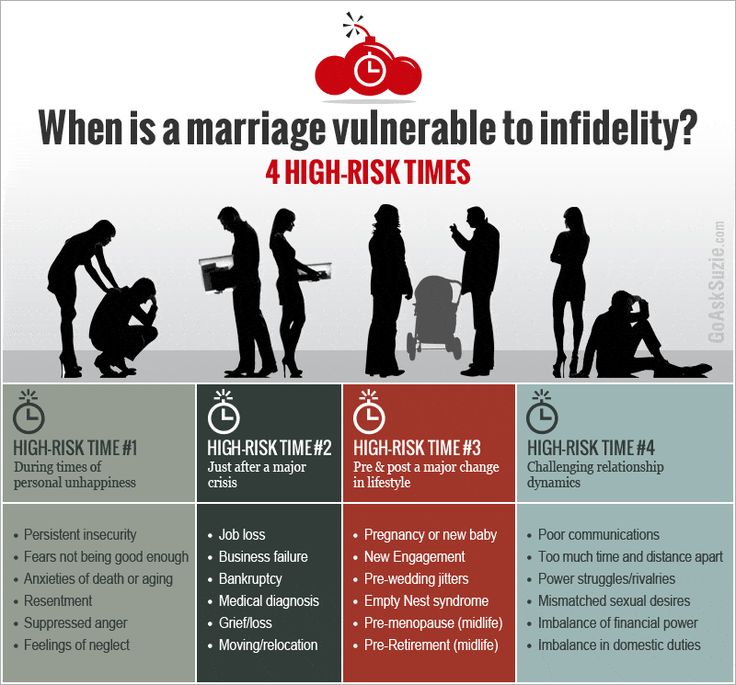 "
"
Don't strive for absolute perfection.
Never give up - remember: even the great ones fail.
Trust your intuition.
Avoid extremes. Strive for the golden mean between lack and excess of virtue.
Have fun; work on your chosen program with humor and optimism.
An interesting lady from Kenya
She was in an interesting position.
"That's the news all of a sudden!" -
Surprised spouse:
He was absent from Kenya for three years.
It's better to be unfaithful than faithful without wanting to be. Brigitte Bardot
Infidelity in a relationship - Tarkvanem ‹ Relationship in a couple - Tarkvanem
Main page / Relations in a couple / Infidelity in a relationship0010
Lateral navigation
One day, one of the parties in the relationship finds out that his/her partner has another. Perhaps he (s) guessed this for a long time - even without visible evidence, he (s) began to feel that his partner had changed. Something has changed in his condition, in the way he looks and how he communicates with a partner. He/she may be away from home more and more often and he/she is losing interest in intimate relationships. This situation worries, but the partner does not answer a direct question. Or maybe this news strikes like a bolt from the blue.
Perhaps he (s) guessed this for a long time - even without visible evidence, he (s) began to feel that his partner had changed. Something has changed in his condition, in the way he looks and how he communicates with a partner. He/she may be away from home more and more often and he/she is losing interest in intimate relationships. This situation worries, but the partner does not answer a direct question. Or maybe this news strikes like a bolt from the blue.
Everything is not the same as before
“I chose long and carefully and thought that you and I have something special and nothing can change it. That you are the one I can always count on. And now I don't know who I am to you. How can I trust you? Are you with me? Am I desirable to you?”
And the couple has a crisis for an indefinite period . Traditionally, we mean sexual infidelity by infidelity, but infidelity can also be emotional, never reaching physical intimacy. The latter can be even more painful for a partner, since sexual infidelity may not always be accompanied by emotional attachment.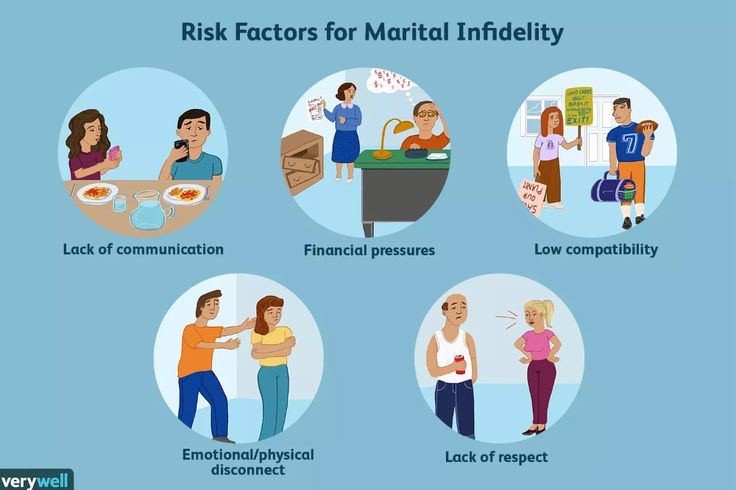 But in this situation it is always a matter of trust and betrayal.
But in this situation it is always a matter of trust and betrayal.
In most cases, the traitor did not want to end the relationship. In many cases, he did not think about starting a relationship on the side, and the fact that everything ended in betrayal is difficult for him too. The constant concealment and lies are tiring. Contrary to popular belief, it is difficult for most people to have multiple sexual relationships at the same time.
The deceived party needs confirmation, checks partner's phone, looks for signs... and can't get rid of the imaginative picture of how things could be. The body becomes restless, sleep and the ability to concentrate disappear. They no longer know what to believe and what not. The whole common past can be intertwined with lies, and this changes the person's idea of \u200b\u200bits role and relationships in general.
Anxiety is added by the realization that deception is never private - others know about it, as a result of which the deceived feels double shame.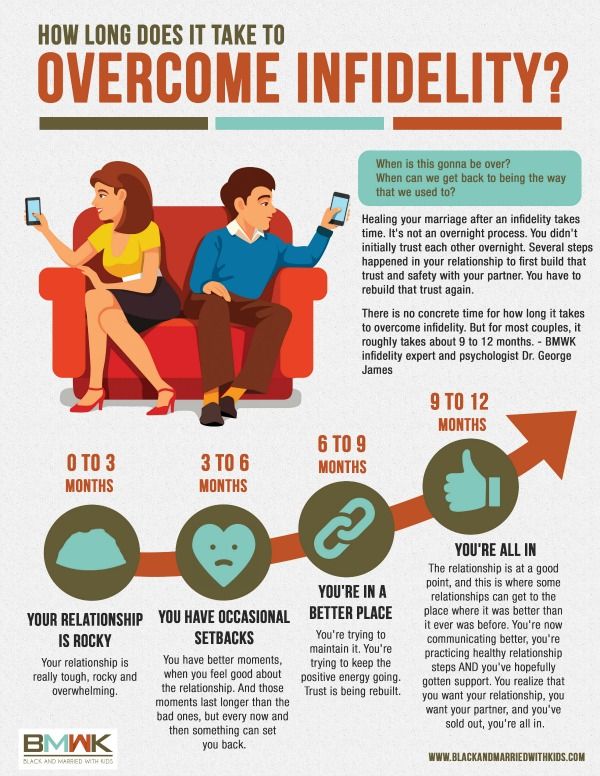 When the case becomes public, the environment puts pressure on the deceived to leave the traitor and does not approve if he does not. "How can you take him back after everything he did to you?"
When the case becomes public, the environment puts pressure on the deceived to leave the traitor and does not approve if he does not. "How can you take him back after everything he did to you?"
Traitor falls into a trap. To save the relationship, the partner needs to restore trust. He has many questions, and they are detailed. The more frankly the traitor tells, the stronger the pain of the partner. All explanations and answers only aggravate the situation. The more responses a partner receives, the greater the risk of losing him - this situation ultimately develops for a traitor.
So what to do?
Relationships don't have to be perfect to feel fulfilled or secure. More than half of relationships go through a crisis caused by infidelity. Perhaps it is this one mistake that can motivate people to start working on their relationships.
In order for a relationship in a couple to become possible, the relationship on the side must end.
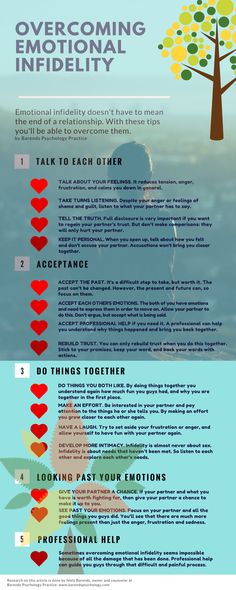
If a person cannot choose between two people - the heart says one thing and the mind another - it is necessary to undergo individual therapy in order to make a decision. You need to gain clarity about your own needs and mourn those relationships that end. Grief takes time and self-forgiveness.
The end of a relationship means that there is no more communication on social networks and meetings without notifying your partner. It may be necessary to change jobs in order not to be with this person together every day.
Relationship security can begin to restore through the boundaries. If a partner is scared, he should be able to look at the phone or computer of the other half, you must be open and emotionally available to him. Usually the cheater is surprised by how long it takes the partner to calm down. It can take years to restore trust. The couple needs time to process what happened and the experience. Only then can we begin to talk about forgiveness.














